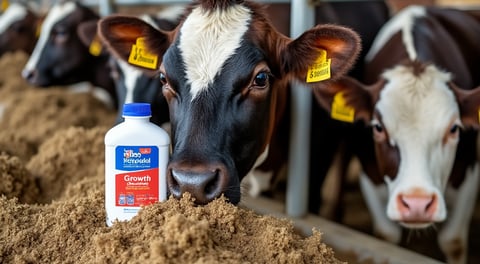The Unveiling of a Hidden Crisis: The Impact of GMO Crops and Hormone-Treated Meat on American Health
In the vast, fertile fields of America, where agriculture defines much of the nation's landscape and economy, a subtle yet profound transformation has been unfolding.
LB
5/8/20244 min read


Informed insights daily.
In the vast, fertile fields of America, where agriculture defines much of the nation's landscape and economy, a subtle yet profound transformation has been unfolding. This transformation, driven by the advent of genetically modified organisms (GMOs) and the use of hormones and antibiotics in meat production, has sparked a contentious debate about the long-term health implications for American consumers. Here, we delve into the complexities of these agricultural practices, examining how they might be contributing to a public health crisis, possibly orchestrated by an elite few focused on profit over people.
The Rise of GMO Crops
Genetically Modified Organisms, or GMOs, have become a staple in American agriculture, particularly in crops like corn, soybeans, and cotton. The primary allure for their adoption was the promise of increased yield, pest resistance, and reduced need for chemical pesticides. However, beneath this veneer of agricultural advancement, there are growing concerns:
Unintended Health Consequences: Although GMOs are rigorously tested for safety, there's a segment of scientific and public opinion that questions the long-term effects. The introduction of genes not typically found in these crops can lead to new proteins or allergens. Studies, including some highlighted in public discourse, suggest potential links to hormonal imbalances, which could affect fertility and overall health.
Environmental and Cross-Contamination Risks: The environmental impact of GMOs isn't just about the crops themselves but also about how they alter ecosystems. Cross-pollination with non-GMO crops or wild relatives could lead to unforeseen ecological changes. Moreover, the heavy reliance on herbicide-resistant GMO crops like those tolerant to glyphosate has led to superweeds and superbugs, escalating the pesticide treadmill.
Hormones and Antibiotics in Livestock
Parallel to the rise in GMO crops, the use of hormones in beef and antibiotics in various meats has transformed animal agriculture:
Hormone Use: Growth hormones in cattle accelerate growth, ostensibly producing more meat with less feed. While the levels are regulated, the cumulative effect on human health, especially with the consumption of hormone-treated meat over decades, is debated. Critics argue that these hormones might contribute to early puberty in children or hormone-related cancers, though definitive human studies are fewer than those on animals.
Antibiotic Resistance: Antibiotics are used not just for treating sick animals but prophylactically, which is a significant concern. The widespread use has led to antibiotic-resistant bacteria, a ticking time bomb for human health. When these resistant strains enter the human food chain, they can compromise our ability to treat bacterial infections, leading to higher morbidity and mortality rates.
The Elite's Role and Economic Incentives
The narrative often points towards an elite class, including biotech firms, large agricultural conglomerates, and policymakers who might prioritize profit over public health:
Profit-Driven Motive: Companies like Monsanto (now part of Bayer) have historically been at the forefront of GMO technology. The economic incentive is clear: GMO seeds promise higher yields and are often patented, ensuring continuous sales. Similarly, pharmaceutical companies benefit from the sale of antibiotics to livestock industries.
Regulatory Capture: There's a theory of regulatory capture where agencies meant to protect public health might be influenced by the industries they regulate. This could lead to lax regulations or enforcement, allowing practices like the use of hormones or GMOs without fully understanding or communicating potential long-term risks.
Public Health Repercussions
Obesity and Diabetes: Diets high in processed foods, many of which contain GMO ingredients, have been linked to rising obesity and diabetes rates. The nutritional profile of these crops might contribute to these health issues, though correlation does not imply causation.
Allergies and Immune Response: There's ongoing research into whether GM foods might increase the incidence of allergies or affect immune function, given the genetic modifications often involve proteins that could act as allergens.
Antibiotic Resistance: This is perhaps the most direct and universally recognized threat. The overuse of antibiotics in farming contributes significantly to the global rise in antibiotic-resistant infections, affecting treatment outcomes for numerous diseases.
The Consumer and Cultural Backlash
Awareness has led to a cultural shift, with consumers increasingly demanding transparency:
Labeling Laws: The push for GMO labeling has gained momentum, with states like Vermont leading the way before federal legislation caught up. This movement reflects a distrust of both the industry and current regulatory assurances of safety.
Organic and Non-GMO Movement: The rise in organic farming and non-GMO products indicates consumer desire for alternatives, even if these often come at a premium price, highlighting a market gap where health concerns trump cost considerations.
Conclusion
The debate over GMO crops and hormone-treated meats in America isn't just about science; it's deeply rooted in economics, ethics, and the dynamics of trust between consumers, producers, and regulators. While not all effects are conclusively proven, the precautionary principle suggests that where there is significant uncertainty, the burden of proof should lie with the proponents of such technologies.
As we stand now, the question isn't just whether these practices are poisoning America but how we balance technological advancement with the imperative to safeguard public health. The narrative of elites poisoning the populace might be hyperbolic, yet it underscores a legitimate concern about the oversight and intentions behind food production practices. The dialogue must continue, informed by science, driven by public interest, and tempered by ethical considerations, to ensure that the food on our plates nourishes rather than undermines our health.
- LB -
Premium Web Hosting
Everything you need to create your website


